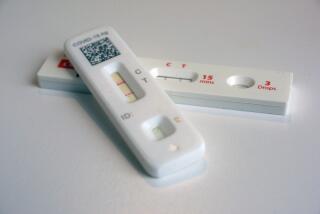The Fear, Hope of Women With HIV
- Share via
The message from the second Los Angeles conference on Women and HIV was an alarm: 1. Women make up the fastest-growing number of AIDS cases.
2. The World Health Organization predicts that by the year 2000, there will be more HIV-positive women than HIV-positive men.
Humanizing those statistics, four courageous women stood up and told of their personal struggles. One was Dawn (her middle name), 31, a musician. She is pretty and blond--and she is HIV positive and symptomatic.
Dawn believes she contracted the virus through intravenous drug use while living in New York in 1980; she tested positive in 1988. She is speaking about it publicly for the first time and she is edgy. She’d like to come out--”It is not morally correct to stay silent anymore”--but is afraid for her career.
“I got tested because I was about to get married and I thought it was a good thing to do. (My fiance) ended up marrying me anyway, and remains negative . . .
“I had a lot of red flags. I didn’t pay attention to them because they just don’t let women know what these red flags are. I had shingles in 1984, I had oral thrush, I had vaginitis, vaginosis, skin disorders, weird Pap smears. I asked doctors over and over again, ‘Should I have an AIDS test?’ ‘No, no, no. You’re not that kind of girl.’ . . .
“Living with HIV, you live with unknown deadlines, which is the hardest part of all. You don’t know anything and that’s probably where the biggest fear comes in. A constant issue is, ‘What will happen to me? What will occur? What will I look like?’ . . .
“(Last) February, I got very ill. I was in bed for seven months. No one knew what was wrong with me. I was hospitalized twice. Every test in the book was done. . . . I lost about a third of the hair on my head. I lost weight. I couldn’t lift a fork to my mouth. . . .
“The disease is so strange; it just flips . . . here I was in March not being able to turn the clicker on for the TV and here I am today being able to speak here. . . .
“I see myself as a long-term survivor of HIV. I think there are a few things that I can contribute to that. Probably the most important is having a good relationship with my doctor. I’m a bitch to my doctor. I have his home phone number and I call him if I don’t feel good because this is my life and I’m not willing to let anyone else have the power over it. . . .
“My husband is my buddy. He is there with me. It doesn’t seem to be an issue with us. Everything is like in a normal marriage. . . .
“Even when you feel hopeless, when you feel helpless with HIV, there’s always a part of me that just feels a little hope. And I think that is terribly, terribly significant in getting you through this. . . .
“I am not a victim of HIV. Nor will I ever, ever, live my life as one. I’m living the best life that I can. In the end, I think that’s the best that any of us can ask for. . . .”
More to Read
Sign up for Essential California
The most important California stories and recommendations in your inbox every morning.
You may occasionally receive promotional content from the Los Angeles Times.










